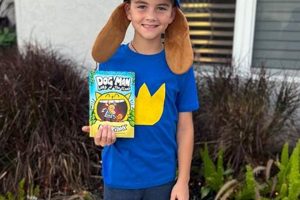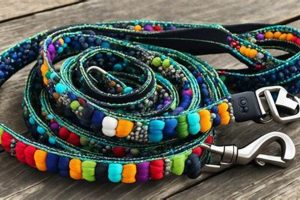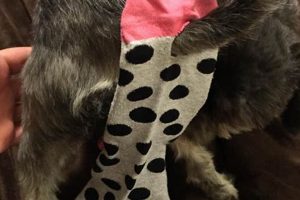This entity functions as a limited liability company that provides self-service bathing facilities for canines, coupled with the retail sale of baked goods designed for canine consumption. The business model centers on offering pet owners the option to wash their own dogs in a purpose-built environment, while also providing treats and other baked items formulated specifically for animal dietary needs.
Such enterprises address the challenges pet owners face when attempting to bathe their animals at home, such as limited space and potential damage to personal property. By offering a dedicated space with appropriate equipment, these establishments contribute to improved pet hygiene practices. Furthermore, the availability of canine-specific baked goods caters to the growing market for specialized pet products, addressing a demand for healthier and more customized treat options.
The subsequent discussion will delve into the operational aspects, marketing strategies, and potential challenges faced by businesses within this niche market, further exploring the factors contributing to their success and sustainability within the pet care industry.
Essential Canine Care and Nutritional Guidance
The following guidelines offer insights into maintaining the cleanliness and well-being of canine companions, alongside suggestions for selecting appropriate nutritional treats.
Tip 1: Implement Consistent Grooming Practices: Regular bathing and brushing are crucial for maintaining coat health and preventing skin irritations. The frequency of bathing should be tailored to the dog’s breed, activity level, and coat type. Over-bathing can strip the coat of essential oils, leading to dryness.
Tip 2: Utilize Appropriate Bathing Products: Employ shampoos specifically formulated for canine use. Human shampoos can disrupt the pH balance of a dog’s skin, potentially causing discomfort or allergic reactions. Ensure thorough rinsing to remove all traces of shampoo residue.
Tip 3: Prioritize Dental Hygiene: Regular tooth brushing is essential for preventing dental disease, a common health problem in dogs. Canine-specific toothpastes should be used, as human toothpastes contain ingredients that can be harmful if swallowed by dogs. Dental chews can supplement, but not replace, brushing.
Tip 4: Monitor Nail Length: Overgrown nails can cause discomfort and affect a dog’s gait. Regular nail trimming is necessary to maintain paw health. If unfamiliar with the procedure, seek guidance from a veterinarian or professional groomer.
Tip 5: Exercise Caution with Canine Baked Goods: When selecting baked treats, carefully examine the ingredient list. Avoid products containing artificial sweeteners, preservatives, or ingredients known to be toxic to dogs, such as chocolate, grapes, or raisins. Opt for treats made with wholesome, natural ingredients.
Tip 6: Consider Dietary Restrictions: Be mindful of any allergies or sensitivities your dog may have when selecting baked goods. Gluten-free or grain-free options may be suitable for dogs with specific dietary needs. Consult with a veterinarian for personalized recommendations.
Tip 7: Practice Moderation: Treats, including baked goods, should be given in moderation as part of a balanced diet. Excessive treat consumption can contribute to weight gain and other health problems. Adjust portion sizes based on the dog’s size, age, and activity level.
Adherence to these recommendations promotes optimal canine hygiene, dental care, and nutritional well-being, ultimately contributing to a longer and healthier lifespan.
The subsequent sections will explore further aspects of canine care, including advanced grooming techniques and specialized dietary considerations.
1. Hygiene Station Accessibility
Hygiene Station Accessibility is a pivotal component of the business model for a self-service pet wash, directly influencing customer satisfaction and operational efficiency. The design and location of these stations within the establishment are critical to the overall user experience and the effective delivery of the service.
- Layout and Flow
The arrangement of washing stations should facilitate easy movement within the space, minimizing congestion and potential conflicts between users. Wide aisles, clear signage, and designated entry/exit points contribute to a seamless and intuitive experience. Poor layout can lead to customer frustration, reduced usage, and negative reviews.
- Equipment Ergonomics
The height of tubs, the reach of spray nozzles, and the positioning of controls must be considered to accommodate a range of dog sizes and owner statures. Adjustable features, such as elevating tubs or flexible spray hoses, enhance user comfort and prevent physical strain. Non-ergonomic design can deter potential customers, particularly those with physical limitations.
- Resource Availability
Essential supplies such as shampoo, towels, and drying equipment must be readily available at each station. A consistent stock of these items, along with functioning dispensers and waste receptacles, ensures a smooth and self-sufficient washing process. Inadequate supply management can disrupt the service and diminish customer satisfaction.
- Cleaning and Maintenance
Regular cleaning of the washing stations is crucial for maintaining a hygienic environment and preventing the spread of disease. Easily cleanable surfaces, efficient drainage systems, and a scheduled maintenance program contribute to a safe and pleasant experience. Neglecting cleanliness can deter customers and damage the reputation of the business.
Effective Hygiene Station Accessibility, achieved through thoughtful design, ergonomic considerations, resource management, and rigorous maintenance, is integral to the success of enterprises offering self-service pet washing facilities. The confluence of these factors ensures a convenient, efficient, and enjoyable experience for both pet owners and their canine companions, ultimately driving repeat business and positive word-of-mouth referrals for “dirty dog diy pet wash & pawstry shop llc”.
2. Nutritional Product Variety
Nutritional product variety directly influences the appeal and profitability of “dirty dog diy pet wash & pawstry shop llc.” The availability of diverse baked goods caters to a broader range of customer preferences and dietary needs, thereby expanding the potential customer base. For instance, offering grain-free, limited-ingredient, and size-specific treats ensures that owners of dogs with allergies, sensitivities, or varying breed characteristics can find suitable options. A limited product selection, conversely, may alienate potential clients and restrict revenue streams. Providing a variety of baked goods acts as a strategic complement to the pet wash service, encouraging impulse purchases and enhancing the overall customer experience. The presence of high-quality, diverse nutritional options can also differentiate the business from competitors, establishing it as a one-stop destination for pet care and treat acquisition.
The impact of nutritional product variety extends beyond immediate sales. It can contribute to customer loyalty and positive word-of-mouth referrals. Owners who find treats that their dogs enjoy and that align with their nutritional philosophies are more likely to become repeat customers. A well-curated selection also allows “dirty dog diy pet wash & pawstry shop llc” to position itself as a knowledgeable and discerning provider of pet products. For example, partnerships with local bakeries specializing in canine-friendly ingredients can elevate the perceived value of the pawstry shop component. Furthermore, offering seasonal or limited-edition treats can generate excitement and encourage frequent visits. The integration of educational materials about canine nutrition can further enhance the customer experience and foster a sense of trust.
In summary, nutritional product variety is not merely an ancillary offering but a fundamental component of the “dirty dog diy pet wash & pawstry shop llc” business model. It drives customer acquisition, fosters loyalty, and enhances brand differentiation. Challenges associated with sourcing high-quality ingredients, managing inventory, and complying with relevant regulations must be addressed proactively to ensure the success and sustainability of the pawstry shop element. The effective integration of a diverse and nutritionally sound product selection is critical for maximizing the overall value proposition and long-term viability of the business.
3. Self-Service Equipment Maintenance
Self-Service Equipment Maintenance represents a foundational pillar upon which the operational viability of a “dirty dog diy pet wash & pawstry shop llc” rests. The functionality and cleanliness of the equipment directly impact customer satisfaction, repeat business, and ultimately, the financial health of the enterprise. For instance, malfunctioning dryers, clogged drains, or soap dispensers in disrepair create negative experiences, potentially driving customers to competitors. Consistent and proactive maintenance mitigates these risks, ensuring a positive and reliable service for each user. A real-world example might involve a planned preventative maintenance schedule for the washing tubs, including regular descaling to prevent mineral buildup and ensure proper water flow. The practical significance lies in the direct correlation between well-maintained equipment and positive customer reviews, leading to increased patronage and revenue generation. Conversely, neglected equipment leads to breakdowns, costly repairs, and dissatisfied clients.
The scope of Self-Service Equipment Maintenance extends beyond mere repairs. It encompasses preventative measures, such as regular inspections, lubrication of moving parts, and replacement of worn components before failure occurs. The selection of durable, high-quality equipment at the outset also significantly reduces the long-term maintenance burden. Consider the impact of using industrial-grade dryers designed for continuous operation versus lower-quality models that are more prone to breakdowns. Additionally, a detailed log of maintenance activities, including dates, tasks performed, and parts replaced, enables efficient troubleshooting and facilitates proactive planning. Integrating a digital maintenance management system can further streamline the process, allowing for automated reminders and tracking of equipment performance. Effective training of staff on basic maintenance procedures, such as cleaning filters and identifying potential issues, empowers them to address minor problems promptly, preventing escalation into more significant repairs.
In conclusion, Self-Service Equipment Maintenance is not simply a cost center but a strategic investment in the long-term success of “dirty dog diy pet wash & pawstry shop llc”. Neglecting maintenance results in operational inefficiencies, customer dissatisfaction, and ultimately, financial losses. A proactive approach, characterized by regular inspections, preventative measures, and well-trained staff, ensures consistent service quality, minimizes downtime, and fosters a positive customer experience. The ongoing commitment to equipment maintenance reinforces the business’s reputation for reliability and professionalism, contributing to sustained growth and profitability within the competitive pet care market.
4. Liability Risk Mitigation
Liability Risk Mitigation is intrinsically linked to the operational framework of “dirty dog diy pet wash & pawstry shop llc.” The self-service nature of the business, coupled with the presence of animals and potentially wet or slippery surfaces, creates inherent risks. Effective mitigation strategies are not merely precautionary measures but essential components for protecting the business from potential legal claims and ensuring the safety of both customers and their pets. A failure to adequately address these risks can result in significant financial liabilities, reputational damage, and potential business closure. For instance, the absence of clear signage warning of wet floors can lead to slip-and-fall accidents, resulting in customer injuries and subsequent lawsuits. Therefore, Liability Risk Mitigation is not a peripheral concern but a core element of responsible business management.
Practical applications of Liability Risk Mitigation within “dirty dog diy pet wash & pawstry shop llc” include the implementation of comprehensive insurance coverage to protect against various potential liabilities, such as customer injuries, property damage, and animal-related incidents. Routine inspections of the premises should be conducted to identify and address potential hazards, such as loose flooring, faulty equipment, or inadequate lighting. Clear and prominent signage outlining safety rules and guidelines for using the facilities is crucial for informing customers of their responsibilities and minimizing risks. Requiring customers to sign waivers acknowledging the inherent risks associated with self-service pet washing can provide an additional layer of legal protection. Moreover, providing readily accessible first-aid supplies and ensuring that staff members are trained in basic first-aid procedures can mitigate the severity of injuries and demonstrate a commitment to customer safety. Regular documentation of safety procedures, inspections, and any incidents that occur can serve as valuable evidence in the event of a legal claim.
In summary, Liability Risk Mitigation is not merely a compliance requirement but a fundamental aspect of responsible business practice for “dirty dog diy pet wash & pawstry shop llc.” By proactively identifying and addressing potential risks, implementing comprehensive safety measures, and maintaining adequate insurance coverage, the business can minimize its exposure to legal liabilities and ensure the well-being of its customers and their pets. The ongoing commitment to Liability Risk Mitigation fosters a safe and welcoming environment, contributing to customer loyalty, positive brand reputation, and long-term business sustainability. However, challenges in risk mitigation will occur so “dirty dog diy pet wash & pawstry shop llc” should handle it with responsibility.
5. Community Engagement Strategies
Community Engagement Strategies represent a crucial element in the success and sustainability of “dirty dog diy pet wash & pawstry shop llc.” These strategies extend beyond simple marketing efforts and aim to establish the business as an integral part of the local community, fostering customer loyalty and positive brand perception.
- Partnerships with Local Shelters and Rescue Organizations
Collaborating with animal shelters and rescue groups enhances the business’s visibility and contributes to a socially responsible image. Hosting adoption events at the pet wash or donating a portion of proceeds to these organizations generates goodwill and attracts customers who value supporting animal welfare. For example, offering a free wash to newly adopted pets through a shelter partnership incentivizes customers to patronize the business while assisting vulnerable animals. This facet directly links the business to a cause, fostering a sense of community support and shared values.
- Participation in Local Events and Festivals
Actively participating in community events, such as pet expos, farmers markets, or local festivals, increases brand awareness and provides opportunities for direct customer engagement. Setting up a booth offering discounted wash services or distributing free samples of baked goods introduces the business to a wider audience and fosters personal connections. A real-world example includes sponsoring a “Best Dressed Pet” contest at a local festival, drawing attention to the business and encouraging participation from pet owners. This integration into local happenings showcases a commitment to the community beyond mere profit motives.
- Loyalty Programs and Customer Appreciation Initiatives
Implementing loyalty programs and customer appreciation initiatives fosters repeat business and strengthens customer relationships. Offering discounts for frequent washes or providing complimentary treats to loyal customers incentivizes patronage and demonstrates appreciation. For example, a “Paw Perks” program offering a free wash after ten paid visits encourages ongoing customer engagement and builds a sense of value. These programs transform transactional interactions into long-term relationships, reinforcing customer loyalty and generating sustained revenue.
- Educational Workshops and Seminars on Pet Care
Hosting educational workshops and seminars on topics such as canine grooming, nutrition, or behavior provides valuable information to pet owners and positions the business as a trusted resource. Partnering with local veterinarians or professional groomers to conduct these sessions enhances credibility and attracts customers seeking expert advice. An example includes offering a workshop on “DIY Dog Grooming at Home” to educate pet owners on maintaining their dogs’ hygiene between professional washes. This educational outreach builds a community of informed pet owners and establishes the business as a valuable asset in the local pet care landscape.
These Community Engagement Strategies synergistically contribute to the long-term success of “dirty dog diy pet wash & pawstry shop llc” by fostering customer loyalty, enhancing brand reputation, and establishing the business as a valued member of the local community. By prioritizing community involvement, the business can cultivate a loyal customer base and achieve sustainable growth within the competitive pet care market.
Frequently Asked Questions
The subsequent questions and answers address common inquiries regarding the services and operational aspects of “dirty dog diy pet wash & pawstry shop llc”. These responses aim to provide clarity and transparency for prospective and existing customers.
Question 1: What is the pricing structure for the self-service pet wash?
The cost of the self-service pet wash is typically determined by the duration of use. Detailed pricing information, including any additional charges for premium services or specific products, is clearly displayed within the facility and on the company website.
Question 2: What types of baked goods are available for canine consumption?
The selection of baked goods includes a variety of options formulated with canine-safe ingredients. Offerings may encompass biscuits, cookies, and other treats designed to cater to different dietary needs and preferences. A complete list of ingredients is available for review prior to purchase.
Question 3: What measures are in place to ensure the cleanliness of the washing stations?
The washing stations are subject to regular cleaning and sanitization protocols. This includes the disinfection of tubs, grooming tools, and surrounding surfaces after each use. Adherence to strict hygiene standards is a priority.
Question 4: What safety precautions are in place for customers and their pets?
The facility is designed with safety in mind, featuring non-slip flooring and secure restraint systems in the washing stations. Customers are required to supervise their pets at all times. Staff members are available to provide assistance and ensure adherence to safety guidelines.
Question 5: Are there any breed or size restrictions for using the self-service pet wash?
There are generally no breed or size restrictions, provided that the pet is manageable and does not pose a safety risk to other customers or staff. However, the business reserves the right to refuse service to any animal exhibiting aggressive or uncontrollable behavior.
Question 6: Are reservations required for using the self-service pet wash?
While walk-ins are typically accepted, reservations are recommended, particularly during peak hours. This ensures availability and minimizes potential wait times. Reservations can be made via phone, online, or through the company’s mobile application, if applicable.
These FAQs provide a foundational understanding of the services and operational policies of the establishment. Customers are encouraged to contact “dirty dog diy pet wash & pawstry shop llc” directly with any further inquiries or concerns.
The subsequent section will explore customer testimonials and reviews, offering insights into the experiences of those who have utilized the business’s services.
Concluding Remarks
This exploration of “dirty dog diy pet wash & pawstry shop llc” has illuminated the multifaceted aspects of operating a self-service pet wash and canine-specific baked goods retail establishment. Critical elements, including hygiene station accessibility, nutritional product variety, equipment maintenance, liability risk mitigation, and community engagement strategies, have been examined to underscore their individual and collective importance in ensuring business viability.
The successful execution of these strategies is paramount for “dirty dog diy pet wash & pawstry shop llc” to thrive in a competitive market. Future endeavors should focus on continuous improvement, data-driven decision-making, and a sustained commitment to customer satisfaction. The integration of innovative technologies and adaptation to evolving consumer preferences will be crucial for maintaining a competitive edge and achieving long-term success.







